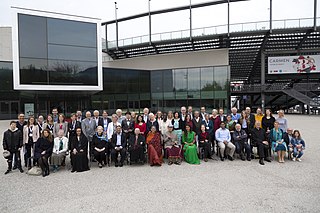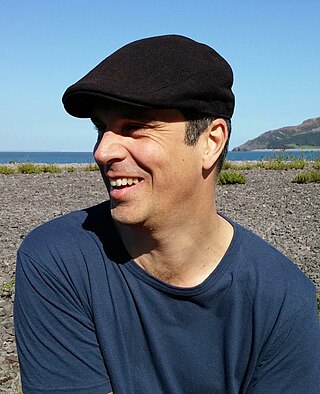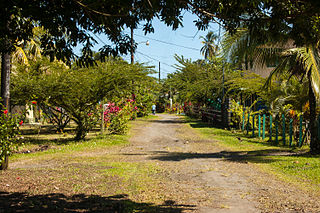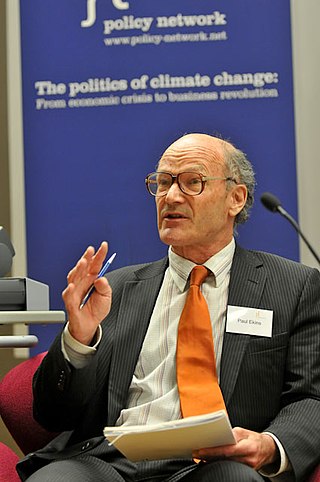
Sir Jonathon Espie Porritt, 2nd Baronet, CBE is a British environmentalist and writer. He is known for his advocacy of the Green Party of England and Wales. Porritt frequently contributes to magazines, newspapers and books, and appears on radio and television.

Food miles is the distance food is transported from the time of its making until it reaches the consumer. Food miles are one factor used when testing the environmental impact of food, such as the carbon footprint of the food.

The World Future Council (WFC) is a German non-profit foundation with its headquarters in Hamburg. It works to pass on a healthy and sustainable planet with just and peaceful societies to future generations.
John Whitelegg is visiting Professor of Sustainable Transport at Liverpool John Moores University and Professor of Sustainable Development at University of York's Stockholm Environment Institute.
The International Institute for Environment and Development (IIED) is an independent policy research institute whose stated mission is to "build a fairer, more sustainable world, using evidence, action and influence in partnership with others." Its director is Dr Tom Mitchell.

Timothy Swanson is an American economics scholar specializing in environmental governance, biodiversity, water management, as well as intellectual property rights and biotechnology regulation.

Felix Dodds is a British author, futurist, and activist. Born as Michael Nicholas Dodds he took the name Felix Dodds, when he was 18. He stood in Mid Derbyshire for the Liberal Democrats in the 2019 General Election. He has been instrumental in developing new modes of stakeholder engagement with the United Nations, particularly within the field of sustainable development. His latest book is Tomorrow's People and New Technology: Changing How We Live Our Lives. In 2019 he was the UK candidate to be the Executive Director of the United Nations Environment Programme. Dodds was the Executive Director of the Stakeholder Forum for a Sustainable Future from 1992–2012. He is probably best known as the author of How to Lobby at Intergovernmental Meetings: Mine is a Café Latte, written with co-author Michael Strauss.
Herbert Girardet is a German-British writer, filmmaker, lecturer and international consultant.

Miguel Mendonça is an Anglo-Azorean writer and musician based in Bristol, England.

Green urbanism has been defined as the practice of creating communities beneficial to humans and the environment. According to Timothy Beatley, it is an attempt to shape more sustainable places, communities and lifestyles, and consume less of the world's resources. Urban areas are able to lay the groundwork of how environmentally integrated and sustainable city planning can both provide and improve environmental benefits on the local, national, and international levels. Green urbanism is interdisciplinary, combining the collaboration of landscape architects, engineers, urban planners, ecologists, transport planners, physicists, psychologists, sociologists, economists and other specialists in addition to architects and urban designers.

Tim Jackson is a British ecological economist and professor of sustainable development at the University of Surrey. He is the director of the Centre for the Understanding of Sustainable Prosperity (CUSP), a multi-disciplinary, international research consortium which aims to understand the economic, social and political dimensions of sustainable prosperity. Tim Jackson is the author of Prosperity Without Growth and Material Concerns (1996). In 2016, he received the Hillary Laureate for exceptional mid-career Leadership. His most recent book Post Growth—Life After Capitalism was published in March 2021 by Polity Press.

Camilla Toulmin, Lady Jones FRSE is a British economist and former Director of the International Institute for Environment and Development (IIED). Her career has focused on policy research about agriculture, land, climate and livelihoods in dryland regions of Africa. She became a senior fellow of IIED in late June 2015, and is Professor of Practice at the Lancaster Environment Centre, Lancaster University.

The European Union (EU) Environmental Policy was initiated in 1973 with the "Environmental Action Programme" at which point the Environmental Unit was formed. The policy has thereafter evolved "to cover a vast landscape of different topics enacted over many decades" (Reuters) and in 2015 the Institute for European Environmental Policy estimated that "the body of EU environmental law" amounted to 500+ directives, regulations and decisions.
"Over the past decades the European Union has put in place a broad range of environmental legislation. As a result, air, water and soil pollution has significantly been reduced. Chemicals legislation has been modernised and the use of many toxic or hazardous substances has been restricted. Today, EU citizens enjoy some of the best water quality in the world"
Ben Caldecott is a British environmentalist and expert in sustainable finance who is the founding director of the Oxford Sustainable Finance Programme at the University of Oxford Smith School of Enterprise and the Environment. At the University of Oxford, he is the inaugural Lombard Odier Associate Professor and Senior Research Fellow of Sustainable Finance, the first ever endowed professorship of sustainable finance, and a Supernumerary Fellow at Oriel College. Caldecott is also the founding director and principal investigator of the UK Centre for Greening Finance & Investment (CGFI), established by UK Research and Innovation in 2021 as the national centre to accelerate the adoption and use of climate and environmental data and analytics by financial institutions internationally. Since 2019, he has also been seconded to the UK Cabinet Office as the COP26 Strategy Advisor for Finance. He is a Trustee of the Green Alliance.
Tim O'Riordan OBE DL FBA is a British geographer who is Emeritus Professor of Environmental Sciences at the University of East Anglia (UEA) and a prominent British environmental writer and thinker.
‘Net positive’, from Positive Development (PD) theory, is a paradigm in sustainable development and design. PD theory was first detailed in Positive Development (2008). A net positive system/structure would ‘give back to nature and society more than it takes’ over its life cycle. In contrast, sustainable development - in the real-world context of population growth, biodiversity loss, cumulative pollution, wealth disparities and social inequities - closes off future options. To reverse direction, development must, among other sustainability criteria, increase nature beyond pre-human conditions. PD develops the tools to enable net positive design and development.

Professor Paul Ekins OBE is a British academic in the field of sustainable economics, currently Professor of Resources and Environment Policy at University College London. He was formerly co-director of the UK Energy Research Centre (2004-2014). He is a former member of the Green Party.
Amelia A. Lake is a British dietitian who is Professor of Biosciences at Teesside University. She works in public health, and is co-founder of the North East Obesogenic Environment Network (NEOeN). She is concerned about the impact of energy drinks on children's health.
Sérgio Campos Trindade was a Brazilian chemical engineer and researcher, specialist in renewable energies and consultant in sustainable business. Trindade was the coordinating lead author for a chapter of an Intergovernmental Panel on Climate Change (IPCC) report, Methodological and Technical Issues in Technology Transfer (2000); the IPCC as an organization won the 2007 Nobel Peace Prize as a result of its contributors' work.
Beatrice Crona is an ecologist, a professor at Stockholm University, and the Executive Director of the Program on Global Economic Dynamics and the Biosphere at the Royal Swedish Academy of Sciences.











